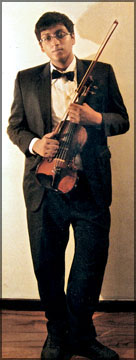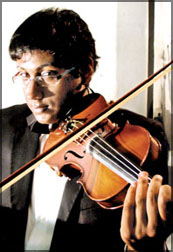A sizzling new star in the horizon
Dominic Johnpillai’s violin recital:
Reviewed by Gwen Herat
He came, he saw and he conquered; I am talking of the teenaged
Dominic Johnpillai. After studying classical music at various stages in
his young life, he took on the likes of his violin tutor, Ananda Dabare,
the romantic string-wizard of Sri Lanka. I noticed a vibrant copy of
Dabare stamped in him.
 |
|
The
Insperables;
Dominic and his violin. |
Domini commenced his musical career at the age of six in
Christchurch, New Zealand where he was born. Dominic joined the Symphony
Orchestra of Sri Lanka and travelled with them to participate in the
Orchestral Week in Tokyo, Japan. Now, after doing some spot recitals, he
will leave for UK to study medicine.
Dominic will have the opportunity there to fit himself to several
recital and debut in the UK if he only seeks it while studying his
chosen profession. Dominic holds a diploma from ARBSM and plays the
piano and guitar apart from his favourite violin.
Making his sole debut at the Russian Cultural Centre this week and
accompanied by Soundari David at the piano who throughout the programme
supported him to the hilt. Had Dominic dropped a note or two or
over-lapped any, David was there to upbeat him.
Electing to play Bach’s Violin Concerto in E Major, Allegro, Dominic
opened the programme with a voluptuous bang; no stage-fright for
debutant and played like a young maestro. This teenager silenced the
audience the moment he raised the bow. His choice for the evening was
great in that a musician has a vast array of classical ‘greats’ to
select from Bach. Wish he had included Sheep May Safely Graze.
Johanne Sebastian Bach (1685-1750). The church and music school of
Lepzig were his life and soul. Tutored by his father, Johanne Ambrosius
Bach, his early music studied were on the violin because Bach senior
never encouraged his son to play two instruments simultaneously at a
tender age.
He was such a gifted musician that his local teacher was outstripped
and the young Bach was sent to choir school run by a Benedictine monk
who later offered him a scholarship.
Thus began his sensational career in music. Bach was a very happy and
confident being which reflects his spirit in what he scored. The only
unhappy event in his life was the death of his wife, Maria Barbara Bach
who was also his cousin and who bore him four children. However, he
married within a year the beautiful Anna Magdalene Wilke who was the
daughter of a court musician.
Bach scored music without a pause not so much for fame or money but
for the church. He wrote 295 cantatas, two hundred and sixty five of
these were written for St. Thomas’s in Leipzig. Among his most famous
melodies is Sheep May Safely Graze and God knows how many times I have
listened to it. However, better known for their grandeur are the full
scale works of the mighty St. Mathew Paddion. He wrote profusely that
one cannot keep track on his scores.
Even as a student I failed though he was one of my favourite Masters.
(My music teacher, Glenice Fernando will vouch for it). The world thinks
of Bach firstly as the composer of the immortal and magnificent
Brabdenburg Concerto, some of the suites and concerto for violin,
harpsichord and various combinations of instruments. In particular, his
scores are spectacular on a single violin or on number of violins only.
So, among many of them, Dominic opted for Bach-Concerto for violin in E
Major.
Without even as much as reading a note, Dominic moved over to play
Violin Concerto No. 1. The liquid flow of Hayden’s strains, rippled away
as a calm and collected Dominic drove away the early night birds outside
the Russian Cultural Centre or did they pause awhile to listen to him?
Whatever his technical limitations are, Dominic rose to the occasion in
sparkling overtures.
Like Bach, Hayden has a vast output of scores and Dominic knew what
was best for his sole debut. He played well but not without the help of
David and one felt as the climax of this score reached that it was David
who plodded along beside the youngster. I saw one of his mentors, Mano
Chanmugam in the audience and he would agree with me.
 |
|
Dominic Johnpillai making his solo
debut at the Russian Cultural Centre, last week. |
The quick and relatively light bows came from David as was intended
by Hayden for the piano. Major part of Hayden’s output and his late
masterpiece were masses or orations Bela Bartok (1881-1945).
More of a modern composer who leaned upon folk music that synthesised
formal classical music mostly for Eastern Europe. His innate talent
ensured there was nothing primitive about its application. Mostly
adapted as dance music for folklore, Bartok took pleasure in composing
with vivacity and allure. In contrast to his acerbility of such works as
the Solo Violin Sonata scored in 1944, Bartok engaged the ear with
colourful pieces. He composed two ballets The Wooden Prince and The
Miraculous Mandarin along with very noisy folk dancing. It was a
challenge for Dominic to put out his music that are mostly complex and
difficult in turn to coordinate on the violin and I must say with many
percussive notes, Dominic was easy on the violin. Very credible for a
young man seeking fame on behalf of Masters of the past. I would say
that Bartok was somewhat a mysterious composer to many of us because he
is essentially a modern scorer more in line with youngsters like Dominic
and Bartok whom I never studied, still remain a distant composer to me.
Tonight, Dominic played Bela Bartok’s Rhapsody Folk Dances for violin
and Piano No. 1.
Edward Greig (1843-1907). The gentle and harmonious composer is a
delight to hear whether on tape or in concert halls. There have been
occasions that many popular icons have been dropped to replace Greig in
Orchestras around the world. Though less fanciful, he also scored folk
music (Hungarian). He is a striking example of a national composer
deeply rooted in his soil.
The soft and gentle Greig no doubt held the heart-string of Dominic
and unfortunately I had to leave my seat before Dominic took his bow.
Before taking on Greig’s Violin Sonata No. 3 in C Minor, there was a
surprise interlude when very boyishly Dominic invited his equally
talented pianist-brother for a surprise duet much to the appreciation of
the audience. |

